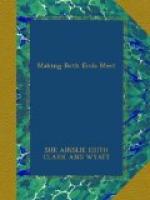Further, it must be remembered that the world in which the shop-girl follows her occupation is a world of externals. The fortunes, talents, tastes, eager human effort spent in shop-window displays on Fifth Avenue, the shimmer and sparkle of beautiful silks and jewels, the prestige of “carriage trade,” the distinction of presence of some of the customers and their wealth and their freedom in buying—all the worldliness of the most moneyed city of the United States here perpetually passes before the eyes of Zettas in their $1.20 muslin waists so carefully scrubbed the midnight before, and of Alices who have had breakfasts for 10 cents. Is it surprising that they should adopt the New York shop-window-display ideal of life manifested everywhere around them?
The saleswomen themselves are the worst victims of their unstandardized employment; and the fact that they spend long years of youth in work involving a serious outlay of their strength, without training them in concentration or individual responsibility or resourcefulness, but apparently dissipating these powers, seems one of the gravest aspects of their occupation.
A proud and very pretty pink-cheeked little English shop-girl, with clear hazel eyes, laid special stress upon unevenness of promotion, in telling of her fortunes in this country.
She was sitting, as she spoke, in the parlor of a Christian “home,” which, like that of many others where shop-girls live, was light and clean, but had that unmistakably excellent and chilling air so subtly imparted by the altruistic act of furnishing for others—the air that characterizes spare rooms, hotel parlors, and great numbers of settlement receiving rooms.
“I had always wanted to come to America,” she said in her quick English enunciation. “And I saved something and borrowed ten pounds of my brother, and came. Oh, it was hard the first part of the time I was here. I remember, when I first came in at the door of this house, and registered, one of the other shop-girls here was standing at the desk. I had on a heavy winter coat, just a plain, rough-looking coat, but it’s warm. That girl gave me such a look, a sort of sneering look—oh, it made me hot! But that’s the way American shop-girls are. I never have spoken to that girl.
“I got down to 50 cents before I had a job. There was one store I didn’t want to go to. It was cheap, and had a mean name. One afternoon, when it was cold and dark, I walked up to it at last; and it looked so horrid I couldn’t go in. There was another cheap store just beyond it, and another. All the shoppers were hurrying along. Oh, it was a terrible time that afternoon, terrible, standing there, looking at those big, cheap New York stores all around me.




